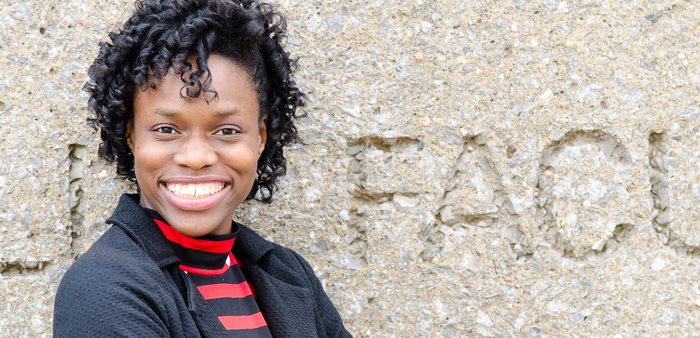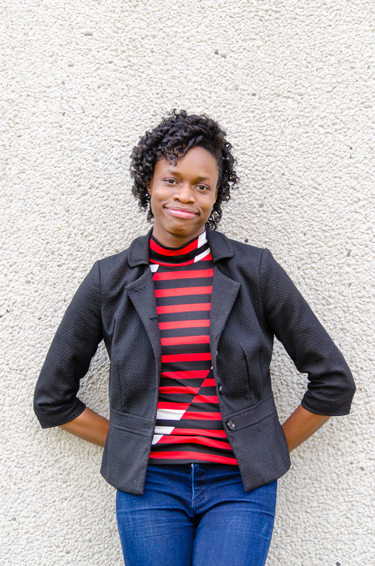Focus Law 2015

Ngozi Okidegbe has made a practice of reaching for the long shots, and it has paid off.
Ngozi Okidegbe first arrived in Montreal eight years ago because she had fallen in love with the city during a visit from her native Washington D.C. She had started her undergraduate education at a liberal arts college in the United States, but made a snap decision to change course.
 “Mid-way through my first year, I just kept thinking about how much I loved Montreal,” she says, smiling at the memory. “One of my friends said, ‘Why don’t you just apply?’ and I said, ‘Huh, I had never thought of that.’”
“Mid-way through my first year, I just kept thinking about how much I loved Montreal,” she says, smiling at the memory. “One of my friends said, ‘Why don’t you just apply?’ and I said, ‘Huh, I had never thought of that.’”
She studied History at Concordia and then applied to McGill Law, uncertain about her chances of getting in.
But she told herself to give it a shot, poured her heart into her admissions essay and then was pleasantly surprised when she was accepted.
She was similarly pleasantly surprised by her successful applications to clerk at the Ontario Court of Appeal, to clerk the Constitutional Court of South Africa, and for her academic publications at the International AIDS conference and for the Canadian Journal of Law and Technology.
“For so many of these opportunities, I thought, ‘Long shot. No way am I going to get that,’” she says. “But in the end, I think you feel just as bad if you don’t apply, if you think you are not good enough. Then you have a terrible feeling inside your heart.”
The newly minted BCL/LLB grad brings this irrepressible energy and enthusiasm to everything she does, and it is her optimism that helped her get through the culture shock of being a first-year student.
“When I started law school, I actually wanted to be an academic but after my first semester, I started thinking, ‘No, I have to be a lawyer, that’s why you go to law school.’ Also, my first semester didn’t go very well, which made me think I had to give up on the dream,” she says, again grinning at the memory. “I got grades I was not accustomed to – I got a lot of Bs, a few B minuses and even one C plus!”
In her second term, she reached out for help, asking upper year students for advice, and found that this improved not only her grades but the entire experience of being at McGill.
“It was really scary, especially for me, to come from a smaller pond at Concordia and be in this huge pond with all these amazing students and not being sure where I was going to fit,” she says. “I think that happens with a lot of students and now that I’m done, one of the things I realize is that there’s no winning law school. There’s no pot of gold at the end that some people get and some people don’t. You just take all the opportunities that come your way and you will find something that will work for you.”
In the second term of her first year, Okidegbe organized a gathering to mark the death of Trayvon Martin, who was shot by a neighborhood watch volunteer in Florida, in February 2012.

“I put a post on Facebook about how I wanted to wear a hoodie in solidarity with those protesting his death in the United States and immediately, I was overwhelmed with comments of others saying, ‘I want to do that, too,’” she recalls. “So we started a group, where over 500 people indicated their support, and we were featured in the local news.”
The experience was Okidegbe’s initiation to the active engagement of the McGill Law student community and she drew inspiration from that to start an exam prep session for first years, to actively mentor other students, and to join the Black Law Students Association, where she has held active posts throughout her time at McGill.
“This is a community where people are really aware of the issues going on and you can always find support for different initiatives,” she says. “There is a stereotype of law students only caring about reading and getting good grades and what is great about McGill Law is that that is not the case. Students are involved in the community and care and want to advance really amazing positive changes.”
In her second-year, Okidegbe hit her stride, becoming a research assistant for Justice Juanita Westmoreland-Traoré and Professor Adelle Blackett. She then authored a paper about HIV discrimination in Nigeria for a class she took with Professor Vrinda Narain, who recommended she try to get it published and look for opportunities to present it, which she then did at the International AIDS conference.
In her third year, she clerked at the Municipal Court of Montreal, preparing a bench memo and observing court proceedings, and she wrote a paper for a class in communication law about bit torrent technology that got her published in the Canadian Journal of Law and Technology.
“I mentor first and second years and I notice that they often count themselves out of opportunities because they think they won’t get it, but at the end of the day, you can’t exclude yourself,” she says, her fearless optimism brimming through her broad smile. “Let yourself get rejected. Let them reject you. Don’t do it for them.”
Ngozi Okidegbe is currently clerking for Justice Mbuyiseli Madlanga at the Constitutional Court of South Africa. Her clerkship is made possible by the Schull Yang International Experience Awards, created thanks to the generosity of Joseph Schull (BA’82, MA’85) and Anna Yang (BCL, LLB’88) to help students gain first-hand international experiences related to their field of study.
